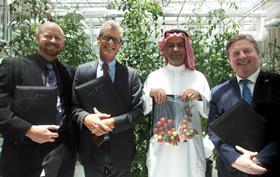
Water-scarce Saudi Arabia is embracing the latest technological advances as it strives to improve food security in the kingdom and beyond.
Red Sea Farms, an agricultural technology spinoff from King Abdullah University of Science and Technology (KAUST), which specialises in saltwater greenhouse technology, has managed to secure a US$$1.9m investment from the KAUST Innovation Fund and Research Products Development Company (RPDC), with the goal of improving the region’s self-sufficiency.
“The Middle East is one of the most water-scarce regions of the world,” said Mark Tester, Red Sea Farms’ co-founder and KAUST professor of Plant Science. “Here we often rely on unsustainable sources of water for irrigation, such as groundwater, which is being rapidly depleted, or desalinated water. Desalinated water requires large amounts of energy to produce, which is costly – at least US$1 for every cubic metre – and has a high environmental impact.”
With its unique combination of engineering and plant science, Red Sea Farms is uniquely placed to serve the growing food security needs of the Middle East region.
The company has developed solutions to produce saltwater-tolerant crops in greenhouses cooled using saltwater. Approximately 80-90 per cent of the fresh water is substituted with saltwater, massively reducing both the water and carbon footprint of food production. As a result, both fresh water and energy requirements are reduced by up to tenfold.
Red Sea Farms plans to use the investment to build a 2,000m2 saltwater greenhouse on the KAUST campus in Saudi Arabia and plans to produce 50 tonnes of tomatoes annually by 2020.
Varieties will reportedly be chosen according to their saltwater tolerance, building on six years of research at KAUST. The tomatoes will be cultivated using up to 30 per cent diluted seawater, which saves on fresh water and improves sweetness, with higher levels of vitamins and antioxidants.
The patent-pending system can apparently be retrofitted to existing greenhouses, with the company aiming to retrofit five per cent of greenhouses in the Kingdom, offering a return on investment for farmers within two years.
'RPDC and KAUST share common interests in commercialising intellectual property and supporting high-tech start-ups in Saudi Arabia,' said Kevin Cullen, vice president of KAUST Innovation and Economic Development. “This investment marks a shining example of the transition of KAUST academic research to commercial application, with the potential to revolutionise the future of food production in Saudi Arabia and the region.”



